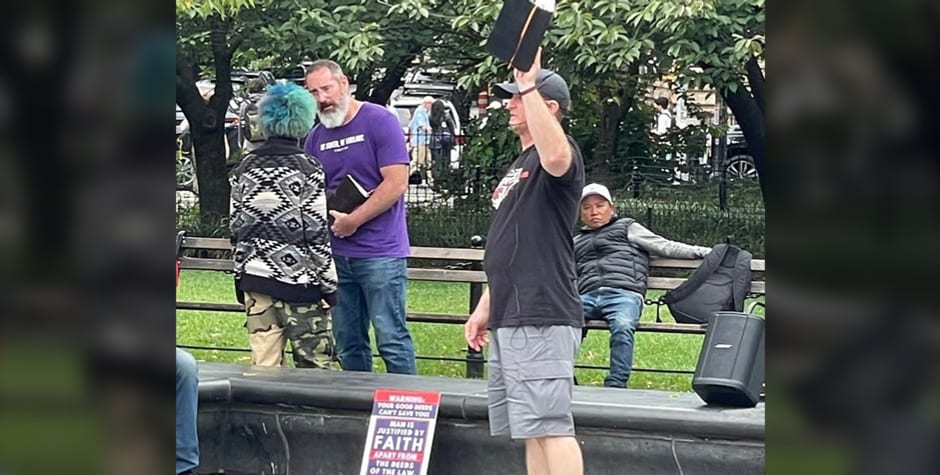Georgia Preacher Criminally Cited for Sharing the Gospel In Front of Abortion Clinic Despite Having a City Permit
Listen tothis article
For years, Jason Cantrell has peacefully shared the Gospel outside an abortion clinic in the suburbs near Atlanta, Georgia. Standing on a public sidewalk, he preaches to passersby and offers encouragement and prayer to women entering the facility. Like many street preachers, Jason uses a small sound amplifier to make his voice audible over nearby traffic. He has always sought to follow the law, obtaining a sound permit from the City of Forest Park before preaching.
USA Today reported on our legal work here.
But this summer, Forest Park police officers issued him a citation anyway. On July 31, Jason was cited for “using amplification devices” after officers claimed he had been asked three times to turn the volume down. The problem wasn’t that Jason didn’t have a permit – he did. Instead, the city’s permit includes a troubling clause stating that it becomes “null and void” if any complaints are received about the noise level. In fact, the officers declared his permit void and immediately issued him a ticket.
In other words, the city has created a system in which anyone who dislikes a message can silence a speaker simply by complaining. That is not how the First Amendment works. Join us as we defend the free speech and religious liberty of Christians from unprecedented attacks: Sign the petition: Defend Free Speech NOW.
A “Heckler’s Veto” on Free Speech
Under Forest Park’s permit policy, officials have made lawful speech entirely contingent on whether listeners react favorably. Once anyone complains – regardless of whether the sound exceeds legal limits – the city automatically treats the permit as void. That means police can punish a speaker who was fully in compliance with the permit’s terms, simply because others objected to the message being spoken.

The Supreme Court has long rejected this kind of “heckler’s veto.” In Forsyth County v. Nationalist Movement, the Court struck down a local ordinance that allowed officials to vary permit fees based on how others might respond to a speaker’s message. The Constitution does not allow speech to be restricted based on listener reaction or public hostility. Likewise, in Saia v. New York, the Court invalidated a law giving police unbridled discretion to grant or revoke sound permits, emphasizing that such schemes invite arbitrary enforcement and censorship.
Forest Park’s “void upon complaint” rule does exactly what those decisions forbid. It hands veto power to anyone within earshot, effectively transforming the city’s sound-permitting system into an instrument of censorship.
A Law-Abiding Preacher Punished for Obeying the Rules
Jason has preached at the same location for years without incident. He knows the importance of respecting law enforcement and city regulations, and he has consistently sought to comply with both. In fact, the city renewed his sound permit even after issuing the citation – though the new permit still carries the same unconstitutional “complaint voids permit” condition.
Jason’s case underscores how such policies operate in practice. When the government ties speech rights to audience approval, unpopular or religious expression will always be the first target. A preacher’s message about faith or the sanctity of life may be deeply meaningful to some and uncomfortable to others – but under our Constitution, discomfort is not a basis for censorship.
As Jason put it:
I did everything the city asked. I got the permit, followed the rules, and stayed on the public sidewalk. But as soon as someone complained, they shut me down. I just want to be a voice for the voiceless, and share the Gospel without being treated like a criminal.
The Case Moving Forward
Jason now faces an ordinance violation charge in Forest Park Municipal Court, scheduled for hearing on November 12. It is a misdemeanor offense, but the constitutional implications reach far beyond this single case. If cities can revoke sound permits or issue citations based merely on complaints, then every pastor, activist, or citizen who speaks in public does so at the mercy of those who disagree.
The First Amendment guarantees that government officials cannot suppress speech simply because someone complains about it. That protection applies equally to street preachers, political advocates, and protestors of every viewpoint. Forest Park’s policy violates those principles by giving private citizens – and by extension, the government – uncontrolled discretion to silence speech they dislike.
The ACLJ is standing with Jason Cantrell to ensure that his rights are protected and that Forest Park is held accountable for its unconstitutional actions. The government cannot make speech a privilege granted only to the popular. The First Amendment protects everyone – even those whose words may provoke complaints. Join with us as we defend the free speech and religious liberty of Christians from unprecedented attacks: Sign the petition: Defend Free Speech NOW.
